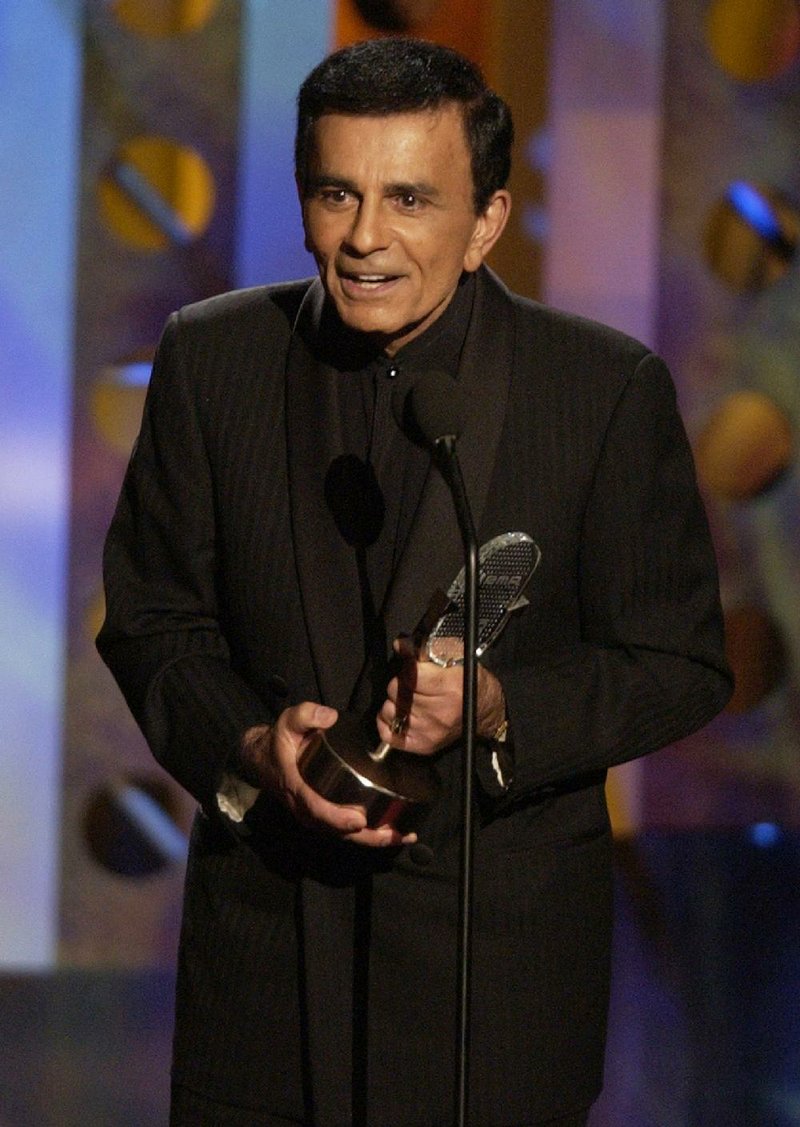LOS ANGELES -- Casey Kasem, the internationally famous radio host with the cheerful manner and gentle voice who became the king of the top 40 countdown with a syndicated show that ran for decades, died Sunday. He was 82.
Danny Deraney, publicist for Kasem's daughter, Kerri Kasem, said Casey Kasem died Sunday morning. A statement issued by the family says he died at 3:23 a.m. on Father's Day, surrounded by family and friends at a Washington state hospital.
"Even though we know he is in a better place and no longer suffering, we are heartbroken," Kerri Kasem wrote on Twitter and Facebook. "The world will miss Casey Kasem, an incredible talent and humanitarian; we will miss our dad."
Kasem's American Top 40 began on July 4, 1970, in Los Angeles. The No. 1 song on his list then was "Mama Told Me Not to Come," by Three Dog Night.
In his sign-off, he would tell viewers: "And don't forget: Keep your feet on the ground and keep reaching for the stars."
Media personality Ryan Seacrest, who took over the countdown from Kasem in 2004, said in a statement that Kasem's death is a loss for radio listeners worldwide. Seacrest said that as a child he'd listen to Kasem's show every weekend "and dream about someday becoming a radio DJ."
"When decades later, I took over his AT40 countdown show, it was a surreal moment," Seacrest said. "Casey had a distinctive friendly on-air voice, and he was just as affable and nice if you had the privilege to be in his company. He'll be greatly missed by all of us."
In recent years, Kasem was trapped in a feud between his three adult children and his second wife, former actress Jean Kasem. In 2013, his children filed a legal petition to gain control of his health care, alleging that Casey Kasem was suffering from advanced Parkinson's disease and that his wife was isolating him from friends and family members. Kasem also suffered from Lewy Body disease, a form of dementia.
A judge in May temporarily stripped his wife of her caretaker role after she moved him from a medical facility in Los Angeles to a friend's home in Washington state. Jean Kasem said she moved her husband to protect his privacy and to consult with doctors. Casey Kasem developed a severe bedsore while in Washington and was in critical condition by the time he was hospitalized in early June.
Kasem's American Top 40 expanded to hundreds of stations, including Armed Forces Radio, and continued in varying forms -- and for varying syndicators -- into the 21st century. He stepped down from American Top 40 in 2004 and retired altogether in 2009, completing his musical journey with Shinedown's "Second Chance."
While many disc jockeys convulsed their listeners with stunts and "morning zoo" snarkiness, Kasem would read "long distance dedications" of songs sent in by readers and introduce countdown records with sympathetic background anecdotes about the singers.
"The idea from the beginning was to do the type of thing on radio that Ed Sullivan did on television, good, honest stories with human interest," he told the Los Angeles Times in 1975.
Kasem's legacy reached well beyond music. His voice was heard in TV cartoons such as Scooby-Doo (he was Shaggy) and in numerous commercials.
The son of Lebanese immigrants, Kasem was active in speaking out for greater understanding of Arab-Americans -- both on political issues involving the Mideast and on arts and media issues.
"Arab-Americans are coming out of the closet," Kasem told The Associated Press in 1990. "They are more outspoken now than ever before. People are beginning to realize who they really are, that they are not the people who yell and scream on their nightly newscast."
Kasem was born Kemal Amin Kasem in 1932 in Detroit. He began his broadcasting career in the radio club at Detroit's Northwestern High School and was soon a DJ on WJBK radio in Detroit, initially calling himself Kemal Kasem.
In a 1997 visit with high school students in Dearborn, Mich., home to a large Arab-American community, he was asked why he changed his name to Casey.
"It didn't sound like a DJ; it wasn't hip. So we decided I'd be 'Casey at the Mike' -- and I have been since," Kasem said.
In the 1975 Los Angeles Times interview, he said he had been doing "a regular screaming DJ show" in San Francisco in the early 1960s when his boss suggested he talk about the records instead.
He was unconvinced, since his screaming routine had gotten him top ratings. But he said he had learned "after a particularly unpleasant situation in Buffalo never to argue with general managers."
Information for this article was contributed by Tami Abdollah and Polly Anderson of The Associated Press.
A Section on 06/16/2014
26264047

